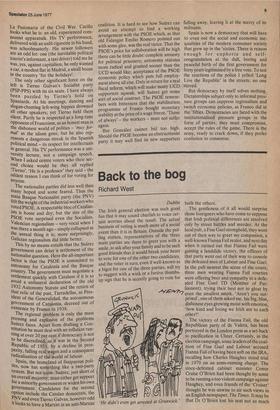Back to the bog
Richard West
Dublin The Irish general election was such good fun that it may sound churlish to voice certain worries about the result. The actual business of voting is much mOre of a social event than it is in Britain. Outside the polling station, representatives of the three main parties are there to greet you with a smile, to ask after your family and to be such good friends that it would break your heart to vote fot one of the other two candidates, and the voter in turn, even if well-known as a bigot for one of the three parties, will try to suggest with a wink or a furtive thumbsup sign that he is secretly going to vote for both the others.
The gentleness of it all would surprise those foreigners who have come to suppose that Irish political differences are resolved only by street battles and murder. At the local pub, a Fine Gael stronghold, they went out of their way to greet my companion, a well-known Fianna Fail zealot, and next day when it turned out that Fianna Fail were gaining a landslide victory, the officers of that party went out of their way to console the defeated men of Labour and Fine Gael. In the pub nearest the scene of the count, three men wearing Fianna Fail rosettes were offering beer and sympathy to a defeated Fine Gael TO (Member of Par
liament), trying their best not to gloat by '47i4c:44/7"7 even the smallest smirk. 'Aren't you surprised', one of them asked me, his big, blue, dishonest eyes growing moist with emotion, 'how kind and loving we Irish are to each other?'
The victory of the Fianna Fail, the old Republican party of de Valera, has been portrayed in the London press as a set-back to pacification in Ulster. Certainly, in the election campaign, some leaders of the coalition of Fine Gael and Labour accused Fianna Fail of having been soft on the IRA, recalling how Charles Haughey stood trial in 1970 on an arms-running charge. The since-defeated cabinet minister Conor Cruise O'Brien had been thought by some to be running a too violent campaign against Haughey, and even friends of the 'Cruiser' thought he was unwise to air such views in an English newspaper, The Times. It may be that Dr O'Brien lost his seat not so much














































 Previous page
Previous page